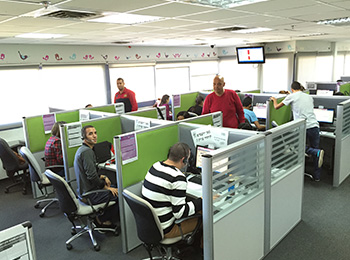Of the many statistics about the economic status of Israel’s Arab citizens, the two that concern me most are that Arab citizens make up 20 per cent of the total population (approximately 1.6 million people) but less than one per cent of Israel’s high-tech industry. For Israel, this is a serious economic and societal liability. For Arab citizens, it means another generation who will not dare to dream.
During my 25 years at Delta-Galil Textiles, a traditional manufacturing company, we took pride in providing jobs to thousands of people, mostly Arabs, at our factories in the north of Israel and in the role these employees played in the company’s success. But as the economy changed and Israel became a startup nation, manufacturing jobs were not able to keep up with the growing income gaps in the country.
Though high-tech was booming, Arab citizens were not integrating into the industry. Dreaming of a major exit or the next world-changing app became a common aspiration among Israeli Jews, but most Arabs were still focused on finding a job, keeping it, and hanging on. Why?
There are many structural answers to this question: a lack of jobs in Israel’s periphery where most Arabs live, separate Hebrew and Arab public education streams that put Arabs at a disadvantage in a professional environment, insufficient public transportation, and daycare options that put education and employment beyond the reach of Arab women especially, to name a few.
I come from these communities and was fortunate to have broken through these barriers myself. As a Delta executive, my exposure to business people and practices around the world changed my understanding of limits. I no longer saw a world of Arabs and Jews, minorities and majorities, but a world of people that followed dreams, and those that feared them.
By and large, Arab citizens in Israel are the latter. Years of muted aspirations have turned into assumptions about the range of possibility and opportunity available to them. This is to the detriment of a community that needs role models, and to a country that needs the creativity of all its citizens.
When Delta was sold and closed its factory doors in the Galilee, it was a deep hit for this northern part of Israel’s periphery. But it was also an opportunity. What if instead of replacing manufacturing jobs, we could bring professional career-building industry to this underdeveloped region? What if Arab women who thought that being a seamstress was their future, could now build business skills and experience? Delta founder Dov Lautman and I set out to create a high-tech enterprise, and revolutionize what the many Arab communities here could imagine.
In 2008 we launched Babcom Centers, a business and software services company, in the Tefen Industrial Park. It was the first ever high-tech company in an Arab area and has since served as a gateway between Israel’s economic centre and its periphery, tapping into the country’s broad human resources – Arab and Jewish, men and women – as part of Israel’s continued growth. (Babcom means “Your Gateway” in Arabic).
Today, we have grown to 1,700 employees – 70 per cent Arab, 70 per cent women – who touch nearly every household in Israel through the call-centers alone. Our values are excellence and service and our motto, “Getting Better Every Day,” refers to each employee’s individual achievements and what we are doing for the country as a whole. We are breaking barriers and instilling hope in a region that needs it. It is the most fun I’ve ever had in business.
Babcom Centers’ success has served as a model for similar businesses that see the benefit and potential in Israel’s domestic human resources. The result has been more jobs and more opportunities outside the centre, and a whole generation now aspiring to professional careers in the industry. This is change in the right direction, but I still have bigger dreams.
Israel’s economic engine is its startup economy and the disruptive force of technological entrepreneurship and innovation. Though there are more startups per capita than any other country, not a single exit has yet been made by an Arab entrepreneur. I believe such an event would kick-start a wave of higher aspiration in the Arab community as well as cultural and economic change in Israel as a whole.
This year, along with high-tech entrepreneurs Erel Margalit and Chemi Peres, we launched Takwin Labs in Haifa as a start-up incubator for Arab citizens. In Arabic takwin means “new beginnings” and “to bring something into life.” We completed our first funding round of $4.5 million out of $20 million this September.
By some estimates, Arab startups could grow the Israeli economy as much as $9 billion a year by tapping into the international Arab-speaking market. As you can imagine, I envision more. With Arab role models, investors, and government support, the meaning of economic development in Israel can go hand in hand with interdependent development, where progress in one region, in one sector improves realities for the whole. Moreover, the empowerment of Arab citizens could inspire Palestinians in the West Bank and Gaza and neighbouring states and serve as a bridge to further the prospects of regional peace. n
Imad Telhami is chairman of Babcom Centers and Takwin Lab.
